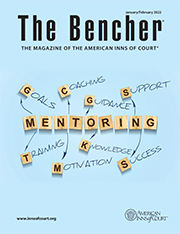You Are Always Mentoring
The Bencher—January/February 2022
By Raymond T. (Tom) Elligett Jr., Esquire and Amy S. Farrior, Esquire
 You are always mentoring—whether you appreciate it or not. New lawyers learn from how they see other lawyers act. As has been said, it is easier to instruct someone how to be virtuous than to be virtuous.
You are always mentoring—whether you appreciate it or not. New lawyers learn from how they see other lawyers act. As has been said, it is easier to instruct someone how to be virtuous than to be virtuous.
The 2001 film Training Day follows Jake Hoyt, played by Ethan Hawke, on his first day as a narcotics officer assigned to the experienced Alonzo Harris, played by Denzel Washington. Their initial encounter begins with Harris explaining what he expects from Hoyt, who sees much more of Harris’ approach as the day goes on. In time, it becomes clear Harris does not just push the limits of permissible policing, he far exceeds them. Washington’s performance as a bad trainer was so good that he won the Academy Award.
Some law firms have formal mentoring programs. In others, training may be less formal: an associate gets a marked-up draft pleading back from a partner or a brief comment. But as in Training Day, the quality of the mentoring will vary from firm to firm, lawyer to lawyer. That is one reason having a mentor outside the new lawyer’s employment can provide benefits, including a different viewpoint.
Mentoring efforts vary by locale. With over 1,000 new lawyers a year in the state, the Florida Bar does not try to pair each new member with a mentor. The Bar sponsors a “Lawyers Advising Lawyers” program where members can seek advice from volunteer attorney advisers. This, and other programs, are on the Bar’s website.
Many smaller voluntary bars and local bar groups provide more personal options. The American Inns of Court has long advocated mentoring within local Inns. The American Inns of Court website provides extensive mentoring materials.
As the website reveals, there are many forms of mentoring besides one-on-one pairings. These include informal settings such as the Inn meetings and pupillage program preparation sessions. Having the variety of input from several more experienced lawyers can avoid the Training Day experience (not that there should be any Denzel-like characters in Inns).
As with many aspects of law, the pandemic affected mentoring. Many Inns and people did not meet in person. One more Zoom-like encounter may not have been viewed as that rewarding. Hopefully, by the time this article appears, the situation will have improved.
We have each had Inn mentees over the years (although not during the pandemic hiatus). Beyond a lunch with just a single pairing, we have found having two pairs of mentors-mentees visit can provide for a more varied and natural interaction. We have tried this with other lawyers in our Inns and together for a cross-Inn experience.
Of course, the cross-Inn mentoring experience can also work on a larger scale. Mentoring groups from multiple Inns can meet for a mentoring “mixer” after work. In our experience, casual settings are far more conducive to forming lasting mentoring relationships than formal (dare we say coerced) ones.
As the Inn mentoring outline observes, mentoring can and should go beyond simply substantive expertise or technical skills. Mentoring is an opportunity to discuss ethical and professionalism issues. For example, how does the lawyer balance a client’s desire to promptly resolve the case with an opposing counsel’s requests for extensions?
The Inn mentoring guidelines suggest how to set up the mentor experience. One facet is selecting mentoring topics in advance. That can be useful to provide a format, but we have been flexible in allowing the discussion to go to areas of interest to the mentees.
Another suggestion is to attempt to pair mentees and mentors who have common practice areas or interests. And while this may sound uncomfortably like online dating sites, the premise that people with common interests are more compatible than people who have nothing in common may apply equally well to forming mentoring relationships.
Indeed, some groups have taken the mentoring/dating analogy to an even higher level: speed mentoring! In this experiment, prospective mentors and mentees meet for a few minutes before moving on to someone else. The obvious goal is to find someone with whom each could create a successful and enduring mentoring relationship. If the right relationship is created, mentoring should naturally follow.
But mentoring happens in group settings as well. While Inn presentations and pupillage groups no doubt provide loads of mentoring opportunities, younger lawyers may still need more basic information and training. Occasional presentations, perhaps before the regular Inn meetings, aimed exclusively at newer lawyers, on topics such as legal writing, time keeping, and marketing afford these Inn members additional opportunities to learn from experienced lawyers, as well as time to get to know and learn from each other.
The bottom line is that mentoring newer lawyers in an array of settings will give these lawyers the best opportunity to learn in ways that work best for them. Just as children learn how to act from their parents, teachers, and others they encounter, lawyers learn from each other. Planning and the right pairings can make the difference between a good mentoring experience and a Training Day one.
Raymond T. (Tom) Elligett Jr., Esquire, is a partner in Buell Elligett in Tampa, Florida. He is a member and past president of the J. Clifford Cheatwood American Inn of Court and serves on the American Inns of Court Editorial Board for The Bencher. Amy S. Farrior, Esquire, is a shareholder in Buell & Elligett PA. She is a member and past president of the C.H.Ferguson-M.E. White American Inn of Court in Tampa.